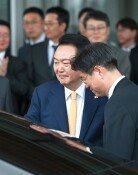Time to allow diverse education methods other than offline classes
Time to allow diverse education methods other than offline classes
Posted May. 12, 2020 07:48,
Updated May. 12, 2020 07:48
As COVID-19 has been re-spreading across South Korea after new cases have emerged from clubs in Itaewon, the Ministry of Education has decided to postpone again the opening of schools for high school seniors from May 11 to May 20. Whether or not students in the second year of high school, the third year of middle school, the first and second years of elementary school, and kindergartens would attend school from May 20 according to the original schedule will be announced later.
It is unfortunate that the Ministry of Education had been unable to make a decision to postpone the school opening date for high school seniors until late yesterday and caused confusion among students and their parents. The ministry also deserves criticism for adding even more confusion by forcing to open schools only a week later – not two weeks to wait for an incubation period – after a long holiday without any emergency measures against the spread of the virus. However, it is inevitable to delay school opening as a number of new cases have been emerging from the clubs in Itaewon. Given the nature of a club, it is challenging to identify those who were there. Without a quick epidemiological investigation, it may lead to a bigger impact than the case of the Shincheonji Church of Jesus in Daegu. Allowing students in group settings at schools under the current circumstance would not only fail to protect students’ safety but also may worsen community infections.
The problem is that students and their parents are experiencing a growing sense of anxiety due to the haphazard postponement of school opening by one or two weeks since March. Under normal circumstances, midterms should have been completed. Normal operation of the school schedule would be unlikely even if students return to schools now. Teachers oppose the government’s proposals of spreading out school start times and physical distancing in classes, saying that the proposals lack the understanding of situations at schools.
As Cho Hee-yeon, the superintendent of the Seoul Metropolitan Office of Education, proposed to the government on Monday, the comprehensive re-examination of the school opening schedule itself is needed. Rather than obsessing with opening schools, a more flexible operation of the curriculum should be allowed depending on each education office and school’s circumstances. One option is to provide classes remotely and only have students at schools for midterms and finals for fairness. Those who are concerned about attending school should be also given a choice to take classes at home without restricting period.
Seniors of high school are subject to the worst impact from repeated delays of school opening. The national academic ability test, which was supposed to take place on May 14, has been postponed again to May 21. Those preparing for rolling admissions are worried about the lack of extracurricular activities on record while others focusing on regular admissions are anxious about insufficient hours spent on studying compared to those who are retaking the college admission test. Details about college admission processes, including the ratio of considering extracurricular activities and the scope of subject content to be included in the college admission test, should be revised and announced to minimize the disadvantage from COVID-19.







